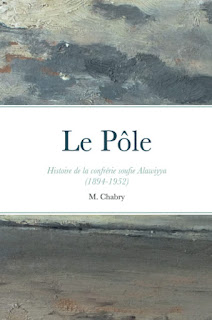Manuel Chabry has just published an excellent study of Shaykh Ahmad al-Alawi (died 1934) and of the Alawiyya, the Algerian-based Sufi order that Frithjof Schuon brought to Europe and then developed into the Maryamiyya.
The study is entitled Le Pôle - La confrérie soufie Alawiyya (1894-1952), and was written as an MA thesis at the École des hautes études en sciences sociales (EHESS), one of France’s leading research institutions for the social sciences and humanities. It is self-published, and available from Amazon for $22.65.
Chabry’s study is exhaustive, and carefully based on primary sources, notably the Alawiyya’s own publications. It falls into three parts: a historical study of the Alawiyya before, under, and after Shaykh al-Alawi (pp. 13-247), an analysis of the Alawiyya’s positions and activities (pp. 249-441), and a selection of primary texts, translated into French (pp. 461-560).
The historical study documents the dramatic expansion of the Alawiyya, especially between 1923 and 1934. The analysis is especially interesting, with short chapters on sanctity, legitimacy, and the Alawiyya’s positions regarding Islamic reformism, modern natural science, modernity in general, and Christianity. This section ends with a chapter on the Alawiyya’s ambition to spread Islam in Europe and another chapter on the Alawiyya’s Western disciples.
The Alawiyya’s central objective, argues Chabry, was “to lead the Sufi orders to play a role in the revival of Algerian Islam in an authentic form, and against the imported innovation of reformism, by emphasizing religious education instead of relying on tribal practices and the organizations of another age.” This involved taking modernity seriously. There is a lot more to it than that, as Chabry also shows, but that is the core of what was going on.
The chapter on Western disciples mentions Schuon, but relatively little is said of him. His relations with the Alawiyya, Chabry thinks, deserve a separate study of their own, but little light is shed on them by the published sources on which Chabry’s study is based. Even so, that study will be of interest for those who are interested in Schuon’s Traditionalism, as it reveals the context of his attachment to Sufism: the Alawiyya in general, and its (often universalist) approach to Christianity and Westerners in particular. It reminds us that Arab Muslims, as well as Westerners, played active roles in shaping relations between Islam and the West.
The study is also an important contribution to the whole question of the adaptation to modernity of Sufism in the Muslim world.


1 comment:
This book is now available in arabic :
https://www.neelwafurat.com/itempage.aspx?id=lbb418216-417938&search=books
Post a Comment